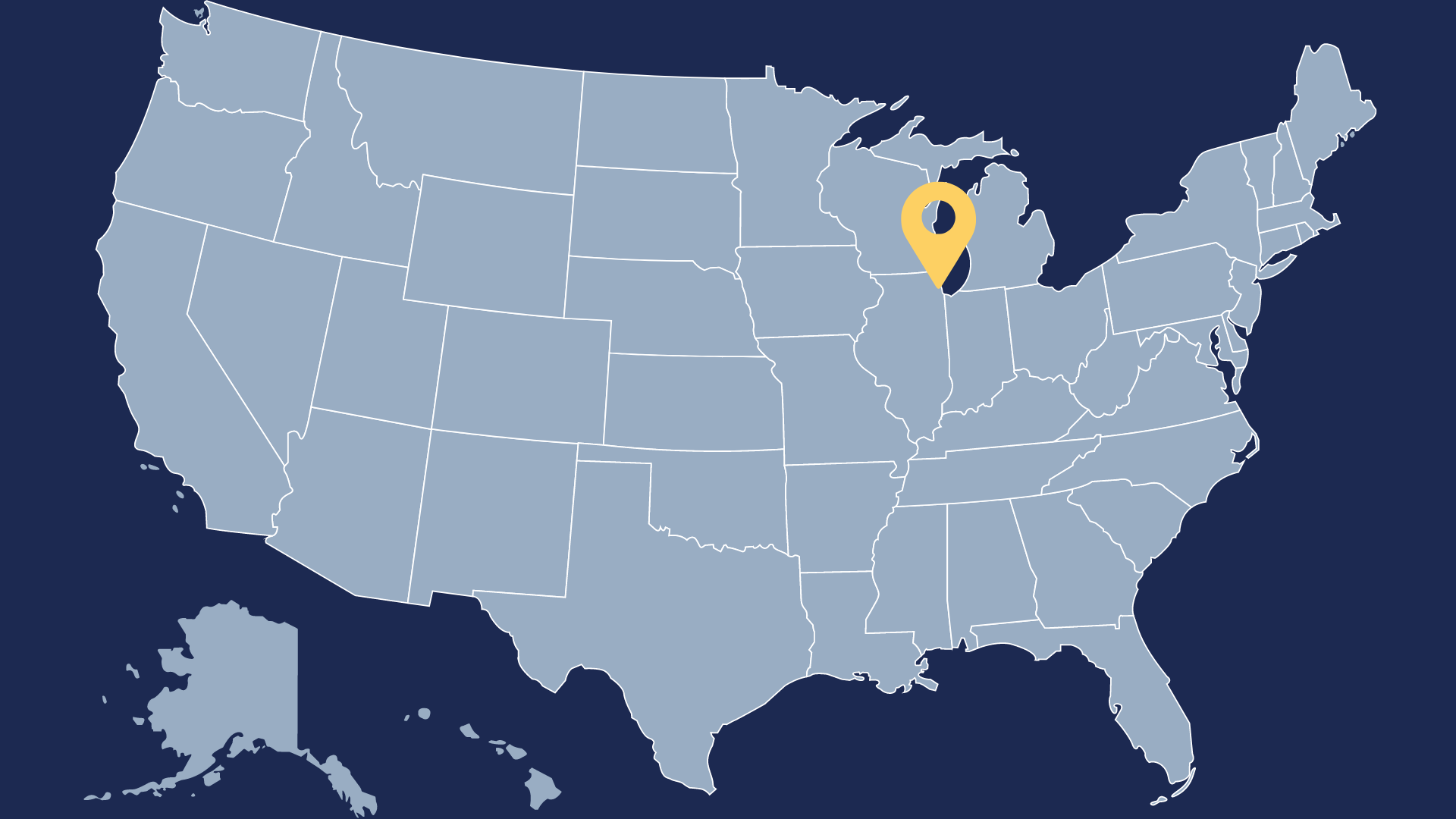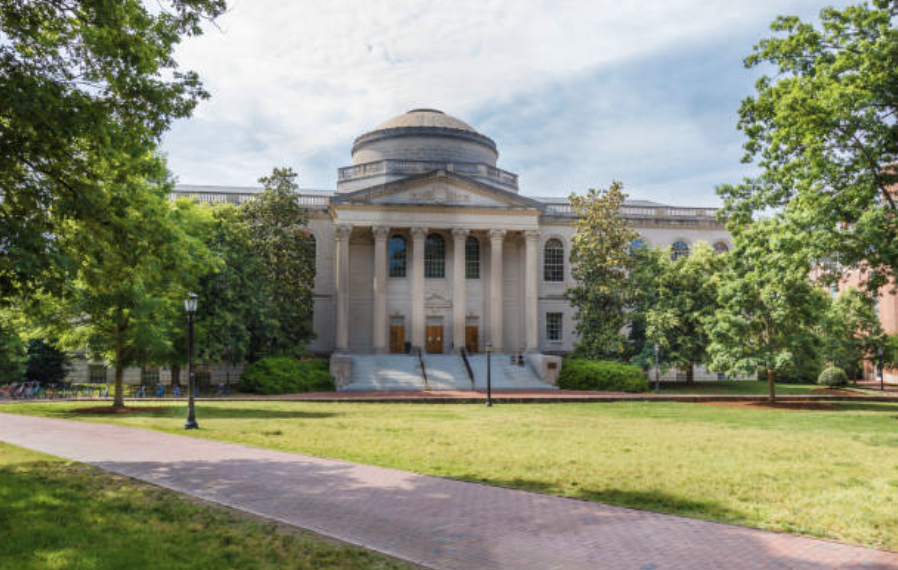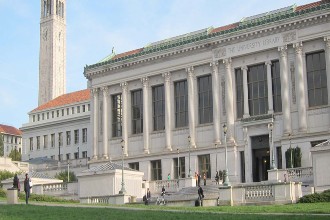REQUIREMENTS AND CAMPUS GUIDE
University of Chicago
Founded in 1890, the University of Chicago is a global research university often referred to as “the Harvard of the Midwest.” It is consistently ranked as one of the top schools in America and challenges students through its multifaceted core curriculum. Excelling both in liberal arts and STEM, the spirit of scholarly inquiry is a powerful undercurrent throughout the institution, and music, economics and politics are standout departments at the university. Nobel Laureates, Pulitzer Prizes and scientific discoveries all evince the school’s devotion to critical thinking and intellectual curiosity for students of all backgrounds and disciplines. The city of Chicago serves as a lively extension of the school’s campus, brimming with internships, service opportunities and artistic endeavors for students to explore as they probe and embrace the world around them. All in all, UChicago has a unique combination of prestige and quirkiness that, situated against the campus’ iconic gothic architecture and the charming neighborhood of Hyde Park, can prove irresistible for brilliant students looking for a place to truly be themselves.
REQUIREMENTS AND CAMPUS GUIDE
University of Chicago
Founded in 1890, the University of Chicago is a global research university often referred to as “the Harvard of the Midwest.” It is consistently ranked as one of the top schools in America and challenges students through its multifaceted core curriculum. Excelling both in liberal arts and STEM, the spirit of scholarly inquiry is a powerful undercurrent throughout the institution, and music, economics and politics are standout departments at the university. Nobel Laureates, Pulitzer Prizes and scientific discoveries all evince the school’s devotion to critical thinking and intellectual curiosity for students of all backgrounds and disciplines. The city of Chicago serves as a lively extension of the school’s campus, brimming with internships, service opportunities and artistic endeavors for students to explore as they probe and embrace the world around them. All in all, UChicago has a unique combination of prestige and quirkiness that, situated against the campus’ iconic gothic architecture and the charming neighborhood of Hyde Park, can prove irresistible for brilliant students looking for a place to truly be themselves.

REQUIREMENTS AND CAMPUS GUIDE
University of Chicago
Founded in 1890, the University of Chicago is a global research university often referred to as “the Harvard of the Midwest.” It is consistently ranked as one of the top schools in America and challenges students through its multifaceted core curriculum. Excelling both in liberal arts and STEM, the spirit of scholarly inquiry is a powerful undercurrent throughout the institution, and music, economics and politics are standout departments at the university. Nobel Laureates, Pulitzer Prizes and scientific discoveries all evince the school’s devotion to critical thinking and intellectual curiosity for students of all backgrounds and disciplines. The city of Chicago serves as a lively extension of the school’s campus, brimming with internships, service opportunities and artistic endeavors for students to explore as they probe and embrace the world around them. All in all, UChicago has a unique combination of prestige and quirkiness that, situated against the campus’ iconic gothic architecture and the charming neighborhood of Hyde Park, can prove irresistible for brilliant students looking for a place to truly be themselves.
School Location:
CHICAGO, IL
School Type:
PRIVATE RESEARCH UNIVERSITY
Admissions Rates:
ADMITTED: 4.77%
GENERAL INFO
SAT/ACT Scores:
Test Optional for 2024-2025
Admission Cycle
Class of 2027 Test Scores
Middle 50% SAT:
1540
Middle 50% ACT: 35
Dates/Deadlines:
Early Decision:
November 1
Early Action:
January 2
Regular Decision:
January 2
School Information:
Undergraduate population:
7,470
Faculty Ratio:
5:1
Interviews Considered:
No
UCHICAGO TIPS & GUIDE
How difficult is it to get into UChicago?
The University of Chicago is an extremely competitive school: only 4.78% of the 38,631 students who applied during the 2023-2024 admissions cycle were accepted. The admitted students had an average GPA of 4.32, and 97% of the students graduated in the top tenth of their high school class. The 50th percentile score of the SAT Composite was 1540 while the 50th percentile score of the ACT Composite was 35. Furthermore, 85% of the UChicago Class of 2027 was involved in community service, 69% in varsity athletics, and 38% in student government in high school. Prospective students who want to strengthen their candidacy should aim to earn top grades and impressive test scores that match or exceed these results and get involved in their school community.
What is the campus like at UChicago?
Chicago is home to UChicago’s main campus, but the university has international campuses all over the world: in Paris, Beijing, New Delhi, and Hong Kong. UChicago’s Chicago campus is actually 20 minutes south of Chicago, in the college town of Hyde Park. Hyde Park is buzzing with fun activities, such as museums, restaurants, concert halls, and theaters. There are plenty of volunteer opportunities for UChicago students who want to engage with their community in a meaningful way. The campus itself is the quintessential cozy college campus, with gothic buildings intermixed with grassy lawns, a pond, and towering trees
Although only around 57% of undergraduates live in UChicago’s housing, campus life is vibrant and the community is tight knit. UChicago’s seven residence halls (known to students as Campus North, Renee Granville-Grossman Residential Commons, Max Palevsky, Snell-Hitchcock, Burton-Judson, International House, and Woodlawn Commons) contain 48 houses, each of which are home to about 80 students—though they can range from 40 to 110 students. The houses aren’t separated by year or field of study, so living on campus is an opportunity for students to meet peers they might otherwise never cross paths with in the classroom. Each house has its own traditions and a staff of both students and faculty who keep the house culture alive. These traditions can include midnight soccer, video game tournaments, baking, study breaks, trivia against other houses, or even trips downtown to try new restaurants.
UChicago has a six quarter residency requirement, whereby first year students must live on campus their first six quarters of enrollment. Summer quarters do not count towards the fulfillment of this residency requirement, however quarters spent in study abroad programs do count. Incoming students complete housing applications providing responses to various questions about their lifestyle and living preferences. After completion, new students are randomly assigned to a residence hall and Houses. After this initial assignment, responses to lifestyle and living preferences within each student’s housing application are used for room and suite mate matching.
Living on campus isn’t the only way to find a community you feel comfortable in at UChicago. With over 450 student organizations, you can find a team or club in which you can discover your passions and get to know your peers outside the classroom. UChicago is also home to University Theater, a student run theater company that puts on 30 shows a year, fraternities and sororities, and hosts of other clubs. If athletics is more your thing, students can watch one of the 20 D3 varsity teams compete, or become involved in one of the 1,000+ intramural teams or nearly 40 club sports.
All first-year students have a meal plan that provides unlimited access to dining halls. After the first year, students choose the meal plan that best suits their needs. UChicago has four different dining commons that have House tables: Bartlett, Cathey, Hutchinson, and Baker Dining Commons. In addition, students can spend Maroon Dollars on guest meals or other foods at select retail locations on campus.
What is UChicago known for?
The University of Chicago has a tradition of excellence that transcends industry. In addition to Presidential Medals of Freedom, Nobel Prizes, and National Book Awards, the school’s alumni have won numerous Emmy, Grammy, Oscar and Tony awards. It is known for having a well-constructed core curriculum that encourages problem solving, critical thinking, and intellectual inquiry that has shaped the minds of notable alumni such as Carl Sagan, Kurt Vonnegut and Katherine Dunham. The campus’ gorgeous architecture, alongside its location within one of the country’s premier cities for finance, technology and the arts are also hugely appealing. What it may lack in enthusiasm for athletics, it more than makes up for in Economics, Music and Political Science, as it’s also well-known and distinguished in these departments. From the iconic application questions to the unique traditions (the Latke-Hamantash debate is a fan-favorite), UChicago’s philosophy of intellectual freedom has inspired a quirky culture that brilliantly eccentric students from all over have historically embraced.
How diverse is UChicago?
UChicago’s Class of 2027 is 31% White, 20% Asian, 17% Hispanic or Latino, 7% Black or African American, 7% of two or More Races and 16% international, and 2% of the class’ race or ethnicity are unknown. In terms of geographical location, 12% of students are from New England, 24% are from the mid-atlantic region, 13% are from the south, 23% are from the midwest, 19% are from the west coast and northwest, and 10% are from the southwest. UChicago has a long history of diversity; the school awarded the first PhD to an African-American woman and their business school was the first to offer a minority scholarship program in the U.S.
How do I apply to UChicago?
You can apply to UChicago through the Coalition or Common Application as well as the Questbridge National College Match program. In addition to submitting your Coalition or Common Application, you’ll need to submit a UChicago supplemental essay. While the supplemental essay is required, there are also other optional supplements for students who want to demonstrate their artistic, research, or musical skills. Additionally, you can submit a video profile to share your thoughts and personality in a way that can’t be conveyed as effectively on paper. In addition to these materials, students will have to submit a $75 application fee or fee waiver, high school transcript and secondary school report, a mid-year report, and two teacher evaluations.
UChicago is a test optional school.. For the Class of 2027, the ACT 50th percentile was 33-35 and the SAT 50th percentile was 1510-1560. These scores only reflect the average scores of admitted students; the overall range was 21-36 for ACT and 1080-1600 for SAT.
UChicago offers four application plans. Students can apply to UChicago Early Action (EA), Early Decision (ED I), Early Decision II (ED II), or Regular Decision (RD). Early Action is a great option for students who are competitive applicants and want to hear back from UChicago early, but don’t want to commit before considering other admissions offers. Early Action applications are due November 1st, and UChicago sends out decisions in mid-December. Early Action may be the best choice for you if you would like to compare multiple financial aid packages from different schools. ED I and ED II are both binding application programs, meaning that admitted students must withdraw all other college applications and enroll in UChicago. The difference between ED I and ED II is merely one of timing: the ED I deadline is November 1st, and students receive their decisions in mid-December, whereas the ED II deadline is January 6th and students hear back in mid-February. The benefit of having an ED II option is that students have the opportunity to apply ED or EA elsewhere first, and if they aren’t accepted, apply to UChicago ED II and still hear back earlier and benefit from a higher admissions rate than if they were to apply RD. The Regular Decision plan has a January 6th deadline and a decision release date in late March.
Does UChicago have a good athletic department?
UChicago competes in NCAA Division III athletics and became a charter member of the University Athletic Association in 1986. Roughly 500 student-athletes compete in the 20 varsity sports. Particularly competitive sports include tennis, track and field and baseball. UChicago’s midwestern rivals include Northwestern University and the Washington University in St. Louis.
What are UChicago’s core curriculum and programs?
UChicago has four collegiate divisions: Biological Sciences, Humanities, Physical Sciences, Social Sciences). Regardless of collegiate division, UChicago students must fulfill the Core Curriculum requirements. Students have more than 50 majors and 50 minors to choose from, as well as 28 specializations. Since UChicago operates on the quarter system, the school year moves at a faster pace than most other four-year universities. As most students participate in internships rather than take classes over the summer quarter, the quarter system typically ends up functioning more like a trimester system. This schedule challenges students to gain more knowledge during their undergraduate years. Fortunately, UChicago offers a lot of support to students; the school’s numerous academic and career advisors help students keep up with the demanding pace and course load.
UChicago’s Core is distinctively known for its small, Socratic-style classes with no more than 19 students per seminar. The Core Curriculum consists of the following course requirements:
- 2-3 courses of physical sciences
- 1-2 courses of mathematical science
- 2-3 courses of biological sciences
- 1-2 courses of arts, music, or drama
- 2-3 courses of humanities
- 3 courses of social sciences
- 2-3 courses of civilization (can be completed by studying abroad)
- 2 quarters of writing seminars
- Students are expected to demonstrate language skills equivalent to one year of college study
Can I afford UChicago?
UChicago has a no barriers policy, which is “a comprehensive plan to increase access to college, support students as they receive an empowering education, and prepare them for lifelong professional success.” That being said, UChicago’s estimated cost of attendance for the 2024-2025 year, without aid, is $93,633 including tuition, room and board, fees, books, and other expenses. According to the no barriers policy, families making under $125,000 (with typical assets) per year will receive the full cost of tuition in aid, while families making under $60,000 (with typical assets) will have tuition, fees and room and board covered. All first generation students receive a $20,000 scholarship over the course of their four years and are guaranteed a paid internship for their first summer, which helps bridge a major achievement gap between students from different educational backgrounds.
If you’re curious about what you and your family would be expected to pay for an education at UChicago, you can use their net price calculator.




